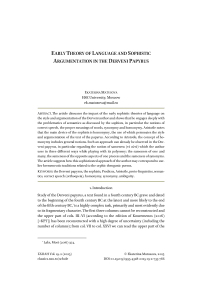Early Theory of Language and Sophistic Argumentation in the Derveni Papyrus
Автор: Ekaterina Matusova
Журнал: Schole. Философское антиковедение и классическая традиция @classics-nsu-schole
Рубрика: Статьи
Статья в выпуске: 2 т.19, 2025 года.
Бесплатный доступ
The article discusses the impact of the early sophistic theories of language on the style and argumentation of the Derveni author and shows that he engages deeply with the problematics of semantics as discussed by the sophists, in particular the notions of correct speech, the proper meanings of words, synonymy and homonymy. Aristotle notes that the main device of the sophists is homonymy, the use of which permeates the style and argumentation of the text of the papyrus. According to Aristotle, the concept of homonymy includes general notions. Such an approach can already be observed in the Derveni papyrus, in particular regarding the notion of sameness (τὸ αὐτό) which the author uses in three different ways while playing with its polysemy: the sameness of one and many, the sameness of the opposite aspects of one process and the sameness of synonyms. The article suggests how this sophisticated approach of the author may correspond to earlier hermeneutic traditions related to the orphic theogonic poems.
The Derveni papyrus, the sophists, Prodicus, Aristotle, proto-linguistics, semantics, correct speech (orthoepeia), homonymy, synonymy, ambiguity
Короткий адрес: https://sciup.org/147251467
IDR: 147251467 | DOI: 10.25205/1995-4328-2025-19-2-735-766


